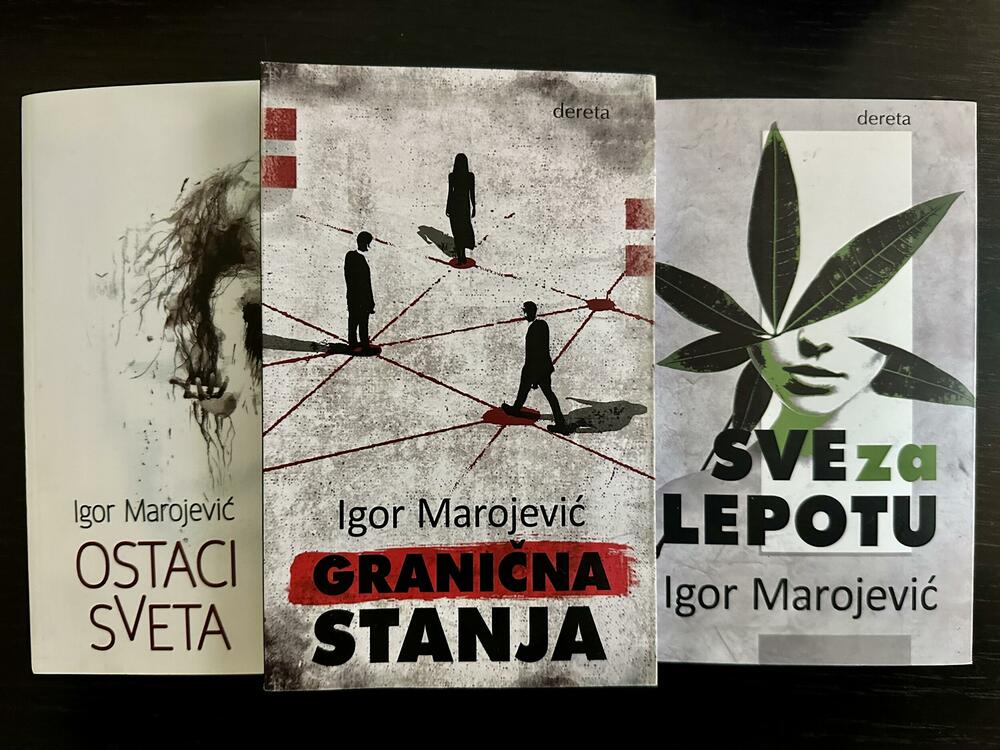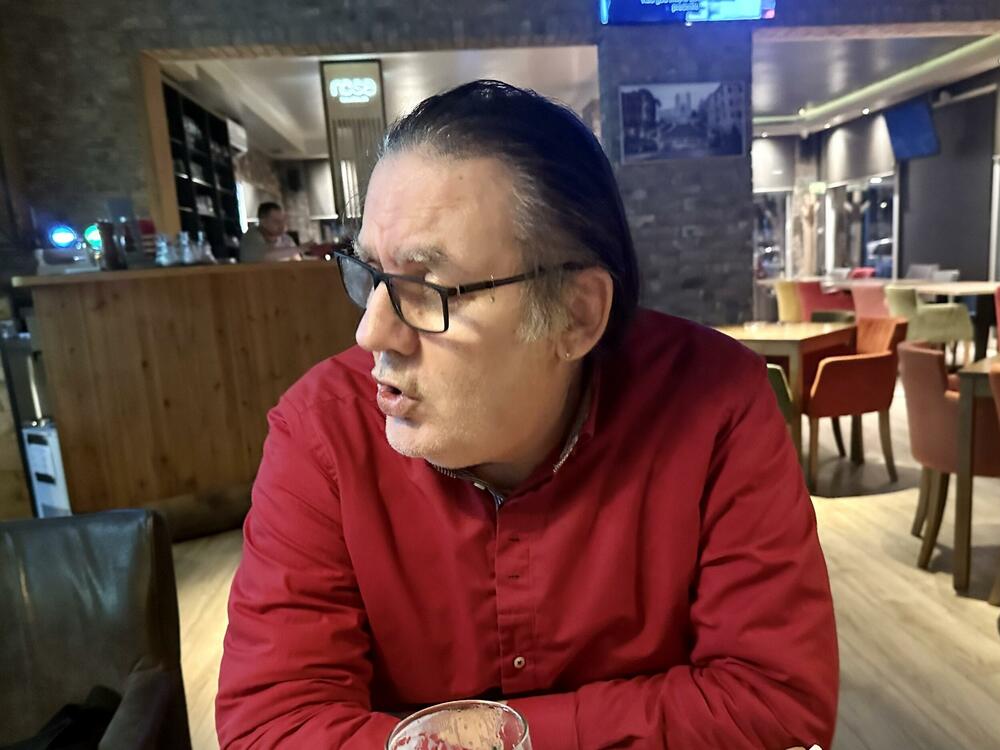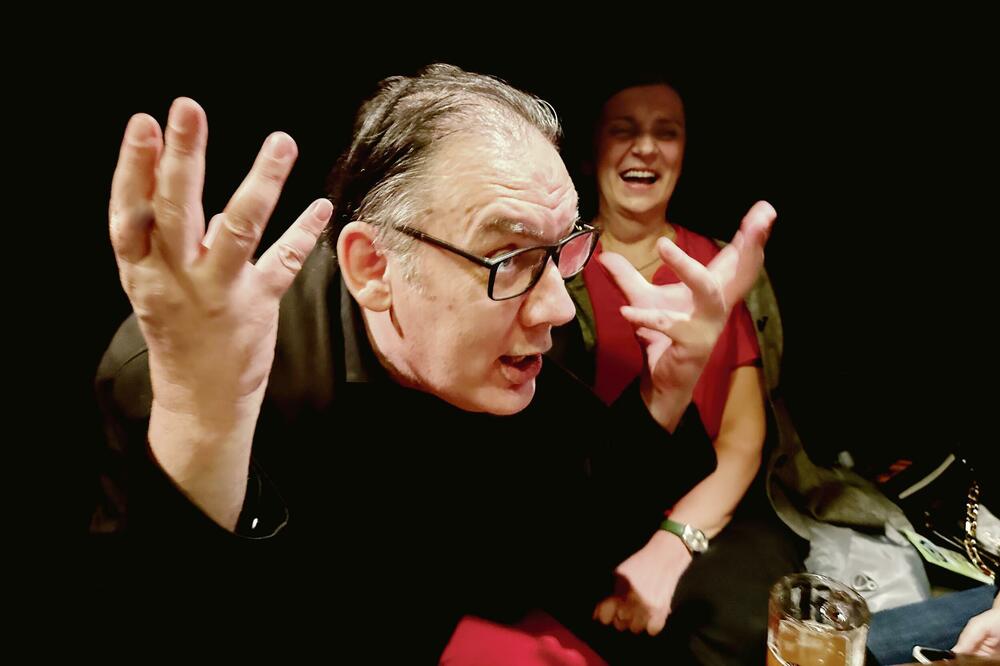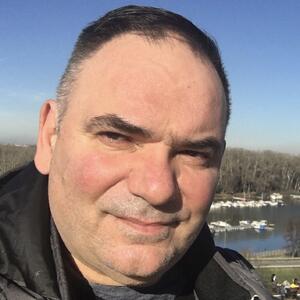With some people, the passage of time puts the cards right. Wrong with some. And with some never. At the beginning, many years ago, I thought that not even time would help Igor and me to get along well.
In the Belgrade literary bazaar, stories, anecdotes and gossip circulated about Igor as a scandal-master. Now, when I tell him that Sarajevo's literary tavern with the grandmasters of taverns such as the late Veljo Milošević, Branko Čučak or Hazim Akmadžić Dajdža made me wary of guys who use the tavern as a stage for dangerous stand-ups in the eighties, he tells me - you just didn't love me bro. I assure him that I just couldn't match his scandal-mastery with the sophisticated passages of his prose. "Thank you for both compliments, although I didn't try hard for the first one, it must have been 'passed on' to me by punk and genetics from my father's side," says Igor and thoughtfully adds: "A lot of things go together if a person is able not to run away from his own extremes and describe as regular an arc around them as possible".
"You can't escape yourself"
Igor Marojević really did not run away from extremes. First, we occasionally started hanging out after literary promotions, in the company of writers who would then fill up the nearby pub. I came to the promotion of his book "Ostaci sveta" in Kolarac, and he came to the promotion of my book in the National Library. Then once with mutual friends we went to Ljuba's studio where we listened to music and drank until dawn. We were buying drinks at the kiosk, and Igor addressed a young man in work overalls: "Dude, are you more Ustashi or more Chetnik?" Apparently Igor was inspired by the screaming headlines of the tabloids displayed on the counter. I thought - I'm running away from this. But the young man just waved his hand, “I'm nothing. I'm just tired".
Afterwards, I asked Igor if he - like me - occasionally wandering around the Belgrade night with cheerful artists, is looking for something or is he running away from something. He says that with such questions, the answer usually contains both options offered by the question. "Admittedly, in this particular case, I'm looking for more than I'm running away from." When I'm looking, I'm looking for something new or a conclusion, and you can't escape from yourself."
We met for the Book Fair on Brod - a floating tavern on the Sava that is open until late. The company had a great time and laughed. I annoyed the strongly national writers among us by toasting Miloš Crnjanski's verse: "Because the great past is a lie". Igor liked that crazy joke.
Another writer, a naturalized Sarajevo native from Vračar, Jimi, with whom I have been friends for decades, inadvertently served as an additional catalyst for our rapprochement. When he came to Belgrade, he liked to hang out with Igor. He recounted anecdotes from socializing to one and the other. Although we never mentioned it, the fact that our fathers came from Montenegro probably brought us closer.
"Border conditions" in Zemun
All this encouraged me to invite Igor to meet and discuss his prose work "Limited States". The book of five longer stories was awarded the Vital award as the best book in the Serbian language last year. We agreed that I should come to Zemun. He lives there. I arrive half an hour earlier, and he is already at the table with coffee and a newspaper. I ask him if the Spanish come earlier than us Germans - alluding to his life in Barcelona and mine in Cologne.

"No, the Spaniards are coming half an hour later. I don't know what's wrong with me today". Over coffee, I ask him what Zemun means to him in addition to all these cities where he lived. "If the center of Belgrade is in constant fifth gear, Zemun is in second gear. As a man who was born and raised in the province, I like that slowness. Because of the Danube and the Austro-Hungarian construction, Zemun is also connected to my native Bačka. Jokes about the people of Zemun have nothing to do with life, like most jokes, in Zemun the neighbors are generally more cultured and respect other people's privacy more than in the center of Belgrade".
All this pleases me - after all, Igor is talking about my birthplace, where I have never lived. I turn the conversation to the award-winning book. "Border states" begins with the story "General places in a state of emergency". At Frankfurt airport, the protagonist tries to strike up a conversation about German philosophy with a German border guard officer. I ask Igor if it is pure fiction or if there are also "borderline experiences" behind this story. "So there was that absurd encounter at the airport, on the occasion of the highlighting of my EU papers due to the state of emergency caused by the Catalan referendum, with me redirecting the event in the glass airport cell according to the rules of the literary craft or as I see them. Otherwise, I have performed in Berlin and Leipzig, I have been anthologized several times and in various frameworks in Germany, although the publication of the book in German as a crown was missing. I also stayed in Cologne, Munich, Stuttgart, Metzingen as the birthplace of Hugo Boss, the main character of my novel "Schnitt." I hardly had more correct relations with members of a nation than with Germans".
In the book, the protagonists, Germans, Slovenes, Bosniaks, Albanians, Montenegrins, and Serbs, have both conciliatory and cruel qualities. Sometimes it flows into each other. "Unfortunately, most people have that, even artists. "Man is a dual being, and extreme contexts bring out from him a less sophisticated part of the personality, which he should make aware without being deceived if he wants good for others and himself," says Igor. Where are you from?
"When someone asks - where are you from, Igor - what is the shortest and what is the correct answer?", I ask him as we switch from coffee to beer. "The shortest is 'from everywhere', and the most accurate, perhaps, is 'from nowhere'. I'm my own master or I'm my own jerk," he tells me without hesitation.
In the conversation, I complete the knowledge about the biography of Igor Marojević. It itself sounds like prose with a lot of twists and turns. He was born in 1968 in Vrbas. Father Radoje is from the village of Morakovo, Nikšićka Župa, and mother Anđelija is from Banjan. My father studied in Novi Sad, and in Vrbas worked for a decade at "Vital". I am amused by the fact that Igor is the only one of the 28 award winners so far who was born in Vrbas. The "Golden Sunflower" is coming home.
Mother studied Serbo-Croatian, she also spoke German. Childhood in Vojvodina lasts until 1973. The family moves to Bar. Igor is five years old and already reads and writes - in the Ekavian variant. At the school on the coast, the children call him "Lepo Belo" because of his pronunciation. When he started wearing glasses, he got the additional nickname Ćoro. The parents switched the pronunciation to factory settings without any problems, it took him longer. "In one class, while reading a written assignment, I spoke the worst Montenegrin. They didn't touch me again until my father died. Now it was fun to tell me 'Fuck your father'." Igor learned to defend himself in Bar. He soon discovers rock and roll, or rather its late derivative - punk. He studies in Belgrade. The next stop is Podgorica. There he decided to deal with prose, edited a literary magazine, wrote for newspapers. Met my future wife. "It was a solid three years," he says.
After four years of living together in Belgrade, his wife leaves for a specialization in Spain, he soon follows her. What is Barcelona to him? "An upgrade for Belgrade, as much as Belgrade for Podgorica, as well as this one for Bar, from which I love Vrbas". Igor says that he has more friends in Barcelona than in the entire Balkans. He learned Spanish and Catalan. Began to write in a language other than his own. The theater institute produced a play for him. The marriage did not survive the Spanish episode, Igor is getting a divorce. It is important for him to say that he is on good terms with his ex-wife. And he keeps coming back to Spain. "Spain is my spare homeland and I express my temperament better in Spanish than in Serbian". However, in the new millennium, he returns to Belgrade. Another shadow darkened his life path. Two years younger sister Ivana dies at the age of thirty-four. He can't write about it yet.
For a long time he was an editor in the most powerful post-Yugoslav publishing house. Then that too ended. He devoted himself entirely to writing. "In Belgrade, I discovered my obsessive theme of Jasenovac, and in Barcelona the equally obsessive theme of the Spanish Civil War, which served as the main thematic framework of my best-known novel 'The Remains of the World'".
In that novel, various historical segments of evil from the last century are connected - from Jasenovac to Srebrenica, Spain in the 400s to the bombing of Belgrade at the end of the millennium. Igor calls those 20 pages "a novelistic road movie through the bloody beauties of the XNUMXth century." He received a number of awards for this book.
Zemun evening
The water level of the beer is rising. Let's talk about music. The eighties. Igor has a band that you can only join if you are over fifty years old and if you are accomplished in some other field. The songwriter and frontman does not give up on rock and roll. "It's a wonderful opportunity to combine poetry, the finest abdominal art and rebellion. It's reduced to alternative, but that's the part of rock and roll that I love the most, that's why I keep coming back to it".

He answered my question about where he was from. At the end, when we get together, I ask him what you only ask good friends - who is Igor Marojević? Is his identity complicated by being a peasant, the burden of his biography, experience, various languages? I like the answer. "I am what I feel I am, even if I don't know what I feel. I try not to get into ethnogenesis, except in fiction. I learned to read and write in Serbia, and it binds me with language. I feel my Montenegrin roots in the tavern and in conflicts, from which I did not run away for a while". He lived for a long time in Spain, now he is from Zemun. Has he settled down? "Since I'm not from anywhere, I wouldn't be attached to any place. The Zemun-Barcelona route seems to me ideal for preserving privacy despite being exposed as an integral part of the job".
I look out the window. It's getting dark already. We hung out for eight hours. How long does it take for a man to meet someone? Once upon a time. Decades. Sometimes one day, or less. Time, like I said, sometimes deals the cards right.
Bonus video:





